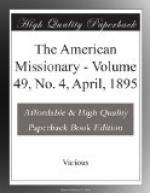THE PROSPERITY OF THE SOUTH.
From time to time there loom up prospects of great advancement in the Southern States. Iron and coal are found in close proximity and in unlimited quantity. At once the boom starts and great cities spring into existence with busy foundries and added railway facilities. But somehow or other the boom loses its fervor and the bright hopes are delayed. Yet the South has vast resources, though they can only be developed gradually, and as capital shall become assured that the labor problem in the South is satisfactorily adjusted.
We are told again that cotton mills are to be transferred from the North to the South. Hitherto cheap cottons have been the product of these Southern cotton mills. But now the promise is that the finest grades of cotton will be produced. Labor is cheap in the South, but skilled labor is very scarce, and no cheaper than at the North, and to transfer such labor from the North will be at the additional cost of transportation.
Great efforts are made from time to time to induce immigrants to settle in the South, and high hopes have been built on such endeavors. But immigrants continue to go to the North and West, and do not go South. This is not because the South is not rich in minerals, in a productive soil and a beautiful climate. Why is it? Capital in the hands of the whites in the South continues to crush labor in the person of the black man under the heel of prejudice. Perhaps the laborer from Europe may dread the same thing.
In spite of all drawbacks, the South is improving, and will continue to improve, and the process will be hastened as the white man lays aside his race prejudice and the black man lifts himself above it by acquiring property, intelligence and character. Whatever helps this consummation does more for the future good of the South than can be done in any other way.
NOTES-BY-THE-WAY.
SECRETARY A. F. BEARD.
Among places of greatest interest which I visited in my late Southern tour one was Tougaloo University. Its location is unique, and its work is also. In the very heart of the black belt of Mississippi, it is sending out its light among thousands who are in darkness. It would quite repay one who would study the problem of saving these children of the rural districts of the black belt to go far out of his way to visit Tougaloo. He should take time for it, to ride over its broad acres of cultivated land, its cotton fields, its fields of sugar cane and corn, its hay fields, all under the care of those who are being educated. They should see its shops for iron working, for wood working, and its varied other industries. They should see those who work by day, diligent students at the books all the long evenings until late. They should see the self help of all. They should go through the grades and notice the quality of the work done and its character, its classes in mathematics and in languages, and its work in the physical sciences. It is a great school—Tougaloo—and if people could see it, they would quote it more for its economy and efficiency. Not always are efficiency and economy found pulling equally in the same harness.




